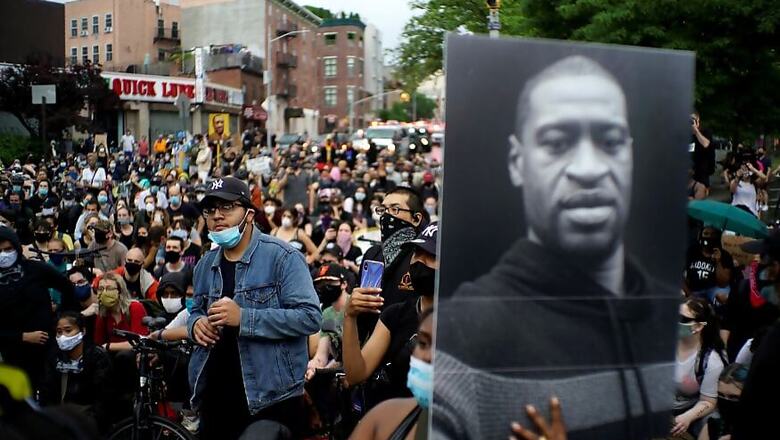
views
An unfortunate and barbaric incident in Minneapolis city of the United States has stirred up widespread protests across the world. Amid the Covid-19 pandemic, it has once again brought to the fore issues such as racial discrimination, apartheid and torture of black people. George Floyd, an African-American man, was killed after a police officer, Derek Chauvin, knelt on his neck for close to 10 minutes while taking him into custody. The incident took place after Floyd allegedly bought a pack of cigarettes with a counterfeit $20 bill. According to standard protocol, the shopkeeper informed the police and they caught hold of him. Cops said he was resisting arrest. After that Chauvin knelt on his neck even as Floyd kept pleading that he was unable to breathe.
The US has not been alien to incidents of racial discrimination and police brutality in recent years. In 2016 as well there was a public uprising against the killing of two black men by the police. The people’s protest started after this because they say the police have a history of racial discrimination against blacks. The protests this time, however, turned violent. By taking the law into their hands, the demonstrators went beyond the virtue of their right and turned a legitimate movement into a violent protest. Shops were raided by people, properties were burnt, and the President then threatened people with virtually a military takeover. The acts of the protesters in the United States were a threat to the rule of law.
British jurist AV Dicey in his 1885 book ‘Introduction to Law of Constitution’ gave the concept of rule of law: nobody is above the law and everyone is equal in the eyes of the law. There are mainly three principles in this theory, that are supremacy of law, equality of law and predominance of the legal spirit. The violent protests in the United States allegedly supported by political leaders opposed to President Donald Trump pose a threat to this concept. Since nobody is above the law, loosely interpreted as no one can take the law in their own hands, the rioting by the people was uncalled for. It is a classic example of people defying the rule of law, the very essence of a healthy democracy. Failure of law and order is a typical example of a dystopian society.
Generally, people resort to such means because they feel that the concerned authorities are not working to the best of their potential and no adequate relief can be provided to them if they go by the rules. The job of ensuring justice is entrusted with the judiciary whose functioning is out of the purview of the government. The judiciary, in order to ensure justice, has to go through a plethora of procedures that might be time-consuming, but it is the best viable option for an egalitarian and just society. Some people have lost their faith in the judiciary due to the delay in the justice delivery, but little do they know that speed may lead to miscarriage of justice. The USA is known for its robust legal system and seeing such violence for justice is indeed shocking. People have been of the view that the judicial system is weak and hence they defy the law. A wrong practice that can adversely affect the country in the long run. Thus, in order to attain justice, it is intrinsic that we lay our faith in the judiciary and go along with the system.
Dr BR Ambedkar during his speech in the constituent assembly said that there is a need to do away with any type of violent protests prevalent during colonial India and resort to constitutional methods to attain justice. These words are not confined to the Indian context but must be followed worldwide to achieve a just society. The United States protests, till the little time they were peaceful, were well and good. But the second they took the course of violence by raiding shops and defying the rule of law, they became illegitimate. Indeed, it is a bold statement but it is the reality. Protests should be conducted in a precise manner with the aim of not creating anarchy but to yield results. There is an institutional hierarchy that must be followed. An institutional hierarchy is a structure of organisations in a specific order where one organisation is subordinate to another, except the one at the top.
The media plays a pivotal role in shaping the structure of society. Media is considered as the fourth pillar of the democratic system. However, it has been witnessed that media agencies fall into the trap of some individuals or organisational ideology with ulterior motive. Often we come across instances where propaganda is being spread in the name of news. Fake news is a paradigm of ways through which false narratives are spread which are filled with malice, with an attempt to break the conventional institution.
To conclude, it is a fallacy if we say that the protests are not politically motivated keeping in mind the US presidential elections scheduled this year. These protests are infusing violence and fear in people's mind because of its nature. There is no doubt that the protests have been started from the demand of justice but it was hijacked by some people in later period. Protests should not take the course of violence which leads to discursiveness from the agenda of the protests. The rule of law should be upheld under every condition and a question must not be raised on the job of the judiciary unless there is a breakdown of law and order and there is a complete state of lawlessness. However, we are indeed sympathetic to the unfortunate act of police brutality and condemn it, and further feel that justice must take its due course.
Also, the need of the hour is to make stricter provisions for the police departments so that they are not in a position to subvert society by misusing their prerogative. Punitive punishment for them is a must that will act as a deterrent in the coming times. We must understand that everyone is equal before the law and thus if they go scot-free, it will be a huge setback for the legal system. Reform and justice is the need of the hour and it should be delivered at any cost, but It can not be delivered in chaos and anarchism. For justice reform, we need a system which only a democratically elected government can provide.
(Ramanand Nand is director of Center of Policy Research and Governance and has worked with the MHRD on the new education policy. Abhinav Kumar is faculty at Law Centre, University of Delhi and a public policy expert. Views expressed are personal.)















Comments
0 comment